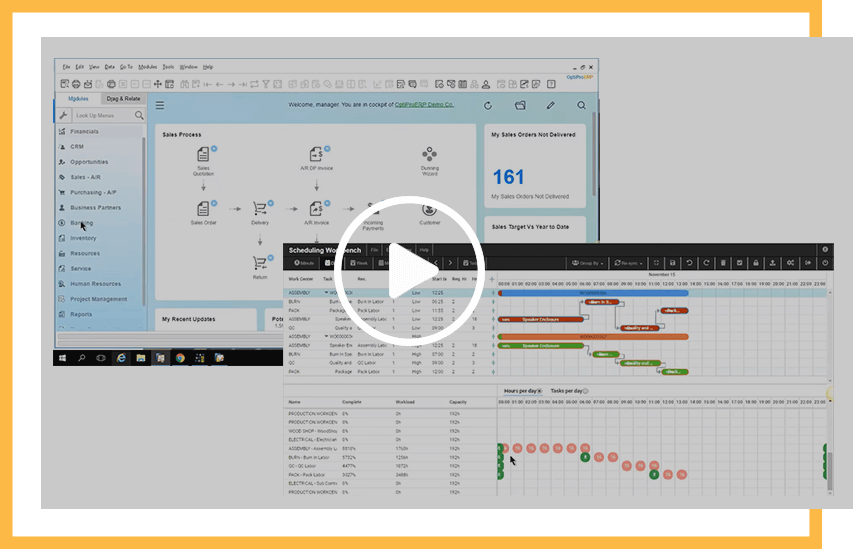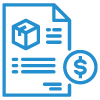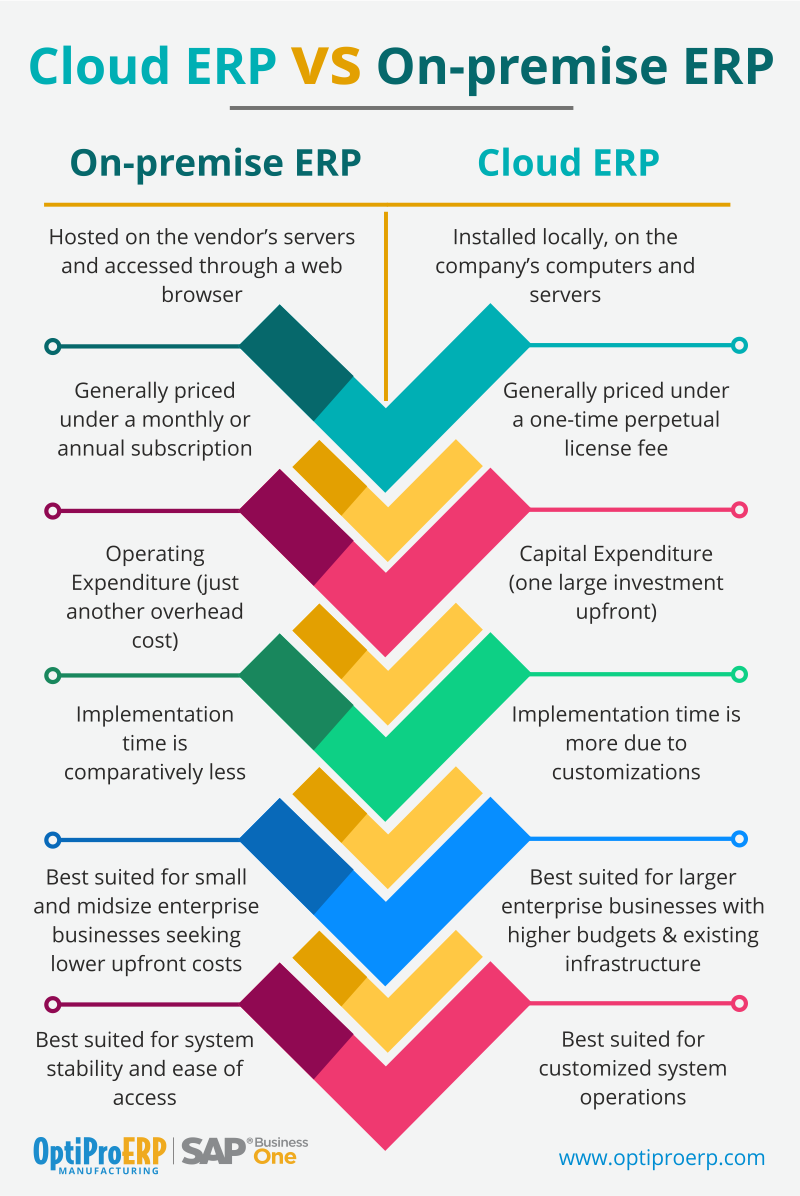Cloud ERP (Enterprise Resource Planning) allows users to access ERP applications and manage data across the organization, over the internet. Cloud-based computing, also known as Software as a Service or SaaS, is a software licensing and delivery model that allows data access from anywhere and from any device.
What is Cloud ERP?
An Introduction to Cloud ERP in the Modern Manufacturing World

Learn how cloud ERP has evolved and how it’s helping businesses of all sizes improve their growth in today’s competitive marketplace.

What is Cloud ERP?
SaaS ERP is software that runs on the vendor’s data center rather than the organization’s IT infrastructure and servers.
How Did Cloud Computing Evolve?
A couple of decades after ERP came onto the market, cloud technology or SaaS (Software-as-a-Service) was introduced. SaaS means software is available via the internet on a pay-as-you-go basis. Cloud ERP’s advanced features and in-depth functionality make it an essential aspect of business in the digital age.
In the early 2000s, cloud applications mostly focused on standalone solutions such as CRM and travel management. Cloud ERP solutions were introduced by leading business software providers. Midsize businesses took a while to accept this new technology as at first it was inflexible and limited in functionality.
Today’s modern ERP systems have transformed dramatically and have been adopted by businesses in every sector and of every size.
Did You Know?
According to Software Suggest, cloud application spending is expected to reach $227 billion USD while cloud services are expected to reach $70 billion USD by 2022.
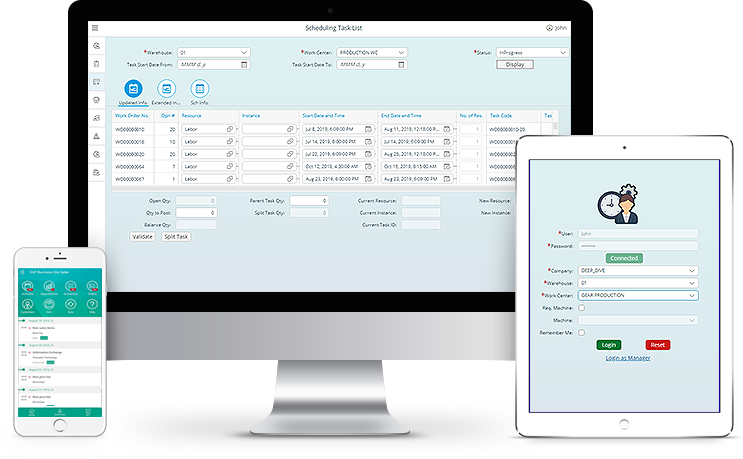


Why Cloud ERP?
Cloud ERP ensures automation, little human intervention, and a lower rate of errors. With cloud ERP, you get greater reliability, faster delivery of products, service improvements, and reduced cost.
Cloud ERP ensures additional data security, improved business performance, flexibility, and easy implementation.
See ERP in Action
Discover how cloud ERP solves manufacturing challenges and enables streamlined operations.
Why Cloud ERP?
See ERP in Action
Discover how cloud ERP solves manufacturing challenges and enables streamlined operations.
Cloud ERP ensures automation, little human intervention, and a lower rate of errors. With cloud ERP, you get greater reliability, faster delivery of products, service improvements, and reduced cost.
Cloud ERP ensures additional data security, improved business performance, flexibility, and easy implementation.

What are Common ERP Features?
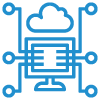

Business Intelligence
Pre-delivered information views represent different aspects of your business performance. Use tailored reporting capabilities to analyze the data most relevant to your KPIs.

Concepts of Cloud ERP

Deployment strategy
Deployment strategy refers to the choices you have when getting the cloud ERP implemented in your organization. ERP can be deployed on private hosted servers, or on-premise, or can be purchased in an “as a service” model.
Before deployment, ERP vendors will need to set a timeline for planning, organizing data, migrating, customization, and training users.

Cloud-based ERP
ERP software that is hosted on the cloud vendor’s datacenter (offsite) and is managed and accessed through a web browser or applications.

On-premise ERP
On-premise deployments are fully owned and managed by the internal team of the organization. It’s easy to apply changes to the infrastructure (software of user device, hardware, communication hardware, etc.) with the on-premise setup.
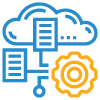
Hosted ERP
Organizations prefer a hosted ERP model when they seek to outsource IT operations. The company gets a license from the hosting provider and the provider manages the hardware and ERP software-related issues including upgrades, maintenance, and more.

Subscription licensing
A fixed subscription fee is paid to use the software. The provider includes software maintenance and upgrade costs in the subscription fee. It is a software licensing and delivery model hosted by the software provider. In many cases, they use the public cloud for hosting data.

Security
Cloud-based ERP is the most secure platform as it promotes encrypted connections between vendors and their customers.
According to a new report published by Allied Market Research the global cloud-based ERP market was valued at $13,238 million in 2016 and is projected to reach $32,184 million by 2023. It is growing at a CAGR of 13.6% from 2017 to 2023.

Cloud ERP vs. On-premise ERP
Cloud-based ERPs are more common in today’s competitive world. By learning about the features of both cloud and on-premise ERP, users can decide which option they should choose.
Cloud ERP
Cloud ERP is hosted and managed and continually upgraded by cloud vendors virtually. The vendor is responsible for installing security updates, applications, data storage, operating system, servers, and more. Cloud ERP ensures lower upfront cost, operating expenditures, and typically takes less time than on-premise ERP to implement.
On-premise ERP
While buying on-premise ERP, the organization pays a one-time, perpetual license fee. The organization licenses the software platform and then leases or purchases networking, storage, and servers to run and manage the software. On-premise ERP users have to pay additional costs for timely maintenance, troubleshooting, customizations, and updates. It takes more time for on-premise ERP to get implemented because of more customizations. And it is best suited for companies with higher budgets and existing infrastructure.

Components of Cloud ERP Software


Financials and Accounting
From general ledger to job costing, cloud ERP gives you a powerful, fully integrated, sized-right platform for improved business performance.


Human Capital Management (HCM)
HCM helps businesses hire, develop, and retain employees with less effort and expense. It provides employees with self-service tools to manage their benefits and have access to training and its powerful reporting helps with strategic planning.


Order Management
Order management tracks every business order, from receipt to delivery, and ensures that no orders are lost. Cloud ERP boosts on-time delivery and cuts unnecessary expenses.
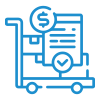

Procurement
From purchase order creation to supplier invoice payment, cloud ERP Procurement helps manufacturers simplify the complex order-to-pay cycle, including creating invoices, returns, and payments.
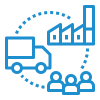

Supply Chain Management
ERP Supply Chain Management helps manufacturers execute supply chain transactions, manage supplier relationships, and control associated business processes to build a resilient, dynamic, and effective supply chain with real-time insight into supplier transactions.
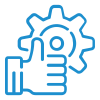

Project Management
Cloud ERP includes a Project Management module that helps businesses define internal and external services as well as manufacturing projects. It helps to structure and maintain engineer-to-order and make-to-order project data easily.
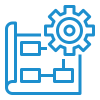

Material Requirements Planning (MRP)
MRP synchronizes and streamlines operations, from sales orders to shipping. It helps manage multi-site distributed demand, track inventory levels, and minimize order lead times.


Inventory Management
Cloud ERP’s Inventory Management module promotes real-time visibility into safety stock, JIT inventory, and on-time deliveries.

Types of Cloud ERP Software
There are three different types of cloud ERP:
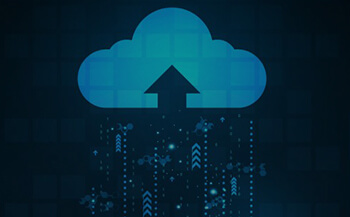
Public cloud
Public cloud is a type of cloud computing where a third-party service provider or vendor manages the on-demand computing services and IT infrastructure. Gartner predicts that worldwide public cloud revenues will exceed $330 billion by the end of 2022.

Private cloud
Private cloud, also known as corporate or internal cloud, is a type of cloud computing that works in a single-tenant environment. Just like public cloud, private cloud also delivers scalability and self-service. The difference here is that private cloud is done through proprietary architecture i.e. the service cannot be shared with any other organization.

Hybrid cloud
Hybrid cloud combines on-premise, private cloud, and public cloud services that can be centrally managed for interoperability. The concept behind the hybrid cloud is to enhance the capability to offer consistency through automation and streamlined management.

Benefits of Cloud ERP

Lower cost
With cloud ERP, there is no hardware to purchase. IT-related costs are eliminated and upgrades and maintenance are taken care of by the cloud provider. Cloud ERP users only pay a subscription fee.
Fast, flexible implementation
The cloud ERP model doesn’t involve owning and installing hardware or software so it is faster to implement. An intuitive user interface makes it simple to learn, speeding the time to productivity.

Business improvements
With cloud ERP, manufacturers can improve operations, change outdated processes, and act on new opportunities. It speeds up finance, accounting practices, and operations across the company.

Lower cost
With cloud ERP, there is no hardware to purchase. IT-related costs are eliminated and upgrades and maintenance are taken care of by the cloud provider. Cloud ERP users only pay a subscription fee.

Fast, flexible implementation
The cloud ERP model doesn’t involve owning and installing hardware or software so it is faster to implement. An intuitive user interface makes it simple to learn, speeding the time to productivity.

Business improvements
With cloud ERP, manufacturers can improve operations, change outdated processes, and act on new opportunities. It speeds up finance, accounting practices, and operations across the company.

Simplicity and automation
Cloud ERP ensures a single source of the truth. Companies can consolidate standalone legacy applications and integrate all existing and new applications to eliminate the use of disconnected systems.

New functionality
SaaS providers ensure continuous upgrades of the software and provide new functionality and application improvements. Automatic updates ensure that the overall pace of innovation is faster and more responsive.

Better insights
Modern cloud ERP systems offer deep and integrated analytics to help predict changes, foresee trends, and automate processes. Cloud ERP helps companies to improve operational efficiency, seize new opportunities, and enhance customer service.

Remote data access
Cloud ERP provides secure mobile device support so users can view, manage, track, and report business information from anywhere, anytime. Cloud ERP has a responsive design that fits nicely with mobile, tablet, and laptop screens.

Access to new technologies
Cloud ERP integrates with innovative technologies such as Artificial Intelligence, Blockchain, Machine Learning, IoT, etc. These technologies allow devices such as machines or sensors to feed data through the cloud to access real-time information.

Deeper security
Cloud ERP security and data backups are handled by full-time professional security experts for the best data protection available. Cloud ERP avoids the risk associated with multiple vendors by providing complete security at points of integration.

Scalability
Every business plans to grow and cloud ERP evolves with your business. Cloud ERP allows companies to add additional computing power or data storage capacity, whenever required.


Cloud ERP Challenges
Cloud ERP is used by a majority of manufacturing companies these days, but let’s see the potential challenges it could present.
Resistance to change
Moving ERP software to the cloud platform means that administrators lose some control over processes because of automation and the IT team also loses control over certain operational processes. The willingness of managers and users to make the change is very important when switching from on-premise ERP to cloud ERP. Therefore, change management is an essential aspect of an ERP deployment.
Compliance and data security
Make sure your cloud ERP vendor stores your critical business data on a reliable data center. Companies with strict regulations and cybersecurity policies will want to be sure that their cloud ERP vendor complies with regulations such as HIPAA and GDPR. Data security is an important element during the data migration process of ERP deployment.
Reduced customization and integration
Cloud ERP software offers limited customization and integration options. Some legacy ERP users find this a drawback and therefore are resistant to switching to a cloud ERP.
Cloud ERP Challenges
Cloud ERP is used by a majority of manufacturing companies these days, but let’s see the potential challenges it could present.
Resistance to change
Moving ERP software to the cloud platform means that administrators lose some control over processes because of automation and the IT team also loses control over certain operational processes. The willingness of managers and users to make the change is very important when switching from on-premise ERP to cloud ERP. Therefore, change management is an essential aspect of an ERP deployment.
Compliance and data security
Make sure your cloud ERP vendor stores your critical business data on a reliable data center. Companies with strict regulations and cybersecurity policies will want to be sure that their cloud ERP vendor complies with regulations such as HIPAA and GDPR. Data security is an important element during the data migration process of ERP deployment.

Reduced customization and integration
Cloud ERP software offers limited customization and integration options. Some legacy ERP users find this a drawback and therefore are resistant to switching to a cloud ERP.


Why Are Modern Manufacturing Companies Moving to Cloud ERP?
For small, mid-sized, and large-scale organizations, the two biggest reasons for moving to the cloud are data security and lower upfront costs.
Cloud ERP is at the heart of a modern, competitive strategy due to its unprecedented speed, ubiquity, and unmatched UI and UX. The reason why fast-growing companies are choosing cloud ERP is that it offers better business intelligence, faster implementation, core competencies, cost savings, and data security.
Intelligent technologies are being integrated into cloud platforms for better productivity and automation. These technologies include the Internet of Things, Machine Learning, AI, etc. These technologies allow machines and sensors to feed data into the application for real-time status of operations and resources.

Why Are Modern Manufacturing Companies Moving to Cloud ERP?
For small, mid-sized, and large-scale organizations, the two biggest reasons for moving to the cloud are data security and lower upfront costs.
Cloud ERP is at the heart of a modern, competitive strategy due to its unprecedented speed, ubiquity, and unmatched UI and UX. The reason why fast-growing companies are choosing cloud ERP is that it offers better business intelligence, faster implementation, core competencies, cost savings, and data security.
Intelligent technologies are being integrated into cloud platforms for better productivity and automation. These technologies include the Internet of Things, Machine Learning, AI, etc. These technologies allow machines and sensors to feed data into the application for real-time status of operations and resources.

Cloud Is More Secure Than You Might Imagine
Manufacturing ERP on cloud supports multi-layer firewall testing, in-stream packet scanning, and unmatched facility security. You don’t have to install security software on each machine, at different locations. With cloud ERP, security is applied to all users, customers, and vendors simultaneously, without any interruption.
Manufacturing Cloud ERP supports multi-layer firewall testing, in-stream packet scanning, and unmatched facility security. You don’t have to install security software on each machine, at different locations. With cloud ERP, security is applied to all users, customers, and vendors simultaneously, without any interruption.
Cloud providers take the highest security measures to protect your sensitive business data. Some of the data security methods on the cloud include encryption, virtual private network, and masking. Disaster recovery is another security feature that helps organizations’ recover data when stolen or lost.
Are you ready for a change?
Thinking about moving to a cloud ERP system? Before you make a change, be sure to review this guide to learn about the best practices for ERP implementation in 2021.

OptiProERP with SAP Business One: Cloud Manufacturing ERP
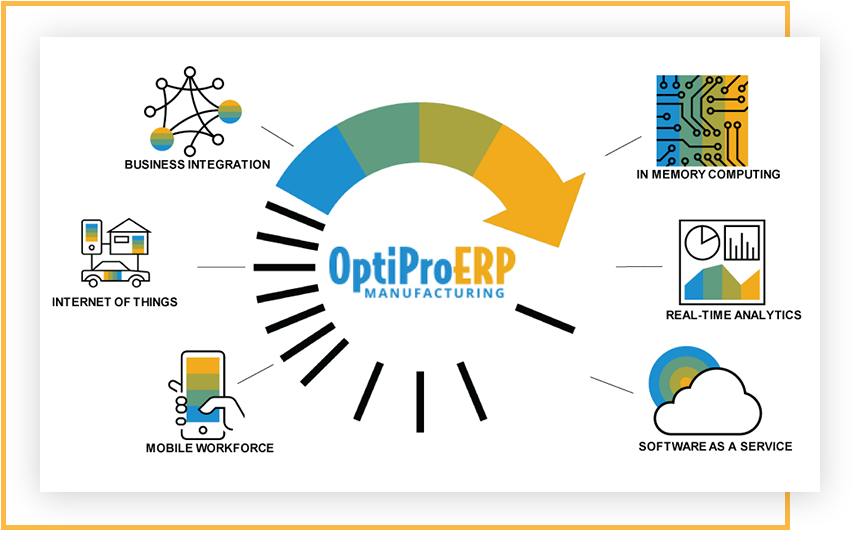
OptiProERP with SAP Business One is the most trusted ERP platform for small and mid-sized manufacturing and distribution companies. It offers real-time insights and improved customer experience by automating and integrating essential financial and operational functions. OptiProERP cloud solution can be implemented quickly with minimal IT staff.
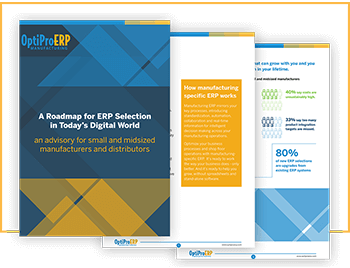

Why Choose OptiProERP With SAP Business One?
Market-Leading Platform
Keep pace with the dynamic manufacturing world with SAP’s market-leading and future-proof platform for small and midsize manufacturers and distributors.
Best-in-Class Functionality
Increase business visibility with OptiProERP with SAP Business One that provides best-in-class industry-specific capabilities for manufacturers and distributors.
Sized-Right Solution
Easy-to-use and implement, OptiProERP is a scalable solution that integrates business data and puts best-practice processes in place.
Trusted ERP for Manufacturers
Maximize your success with our 20+ years of optimizing businesses like yours, full-service support, SAP ecosystem, and customer-first practices.
See OptiProERP’s Best-of-Breed Solution in Action


